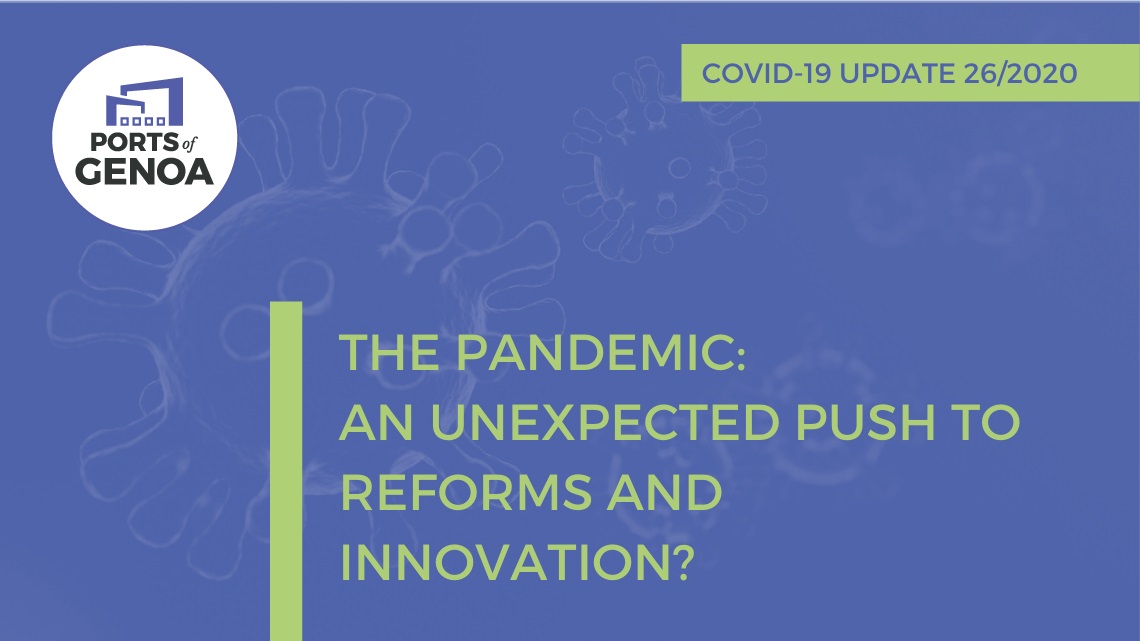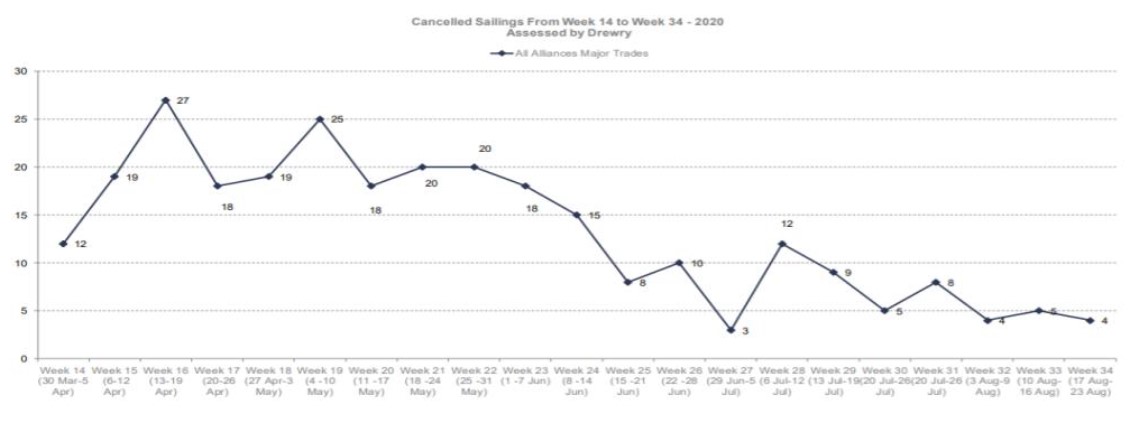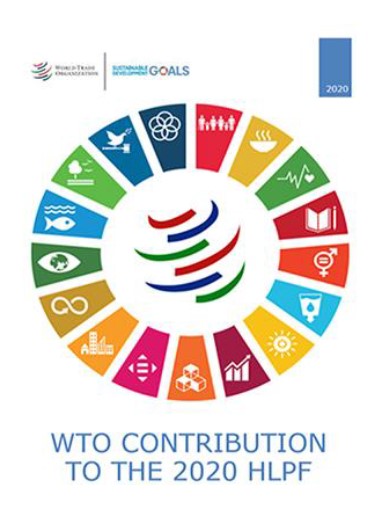
Shipping & Logistics
Container Shipping
Despite less vessel calls than before the COVID-19 pandemic started, cargo volumes are returning in some regions. Generalised lockdowns now limited, the return of vessels and the lower numbers of blank sailings continue, yet these happen at a slow pace. As a result, for the first time since starting the measurements, the percentage of ports reporting that the number of container ships calls corresponds to a normal situation has exceeded the 50% threshold.

Financial Policies, Trade and Sustainability
Europe’s big deal
After long days of negotiations, on July 21, the leaders of the European Union found an agreement on the €750 billion recovery plan to counter the economic shock resulting from the COVID-19 crisis and, in particular, to support economic recovery in member states.
What is unique is that the EU itself, rather than individual members, will directly issue bonds to fund the stimulus. Moreover, the money raised will be used to provide direct grants of €390 billion to member states, with the remainder being provided in loans. This new deal represents, by far, the biggest unified fiscal action undertaken by the EU.
The EU recovery plan will be geared around climate action, including an expansion of the EU emissions trading scheme (EU ETS). Central to the bill is a ‘Recovery and Resilience’ facility, which will offer financial support for investments and reforms, including in relation to green and digital transitions.
The Commission has committed to use the Taxonomy of sustainable activities to guide investments made by the recovery funds.
The “Taxonomy Regulation” on Sustainable Finance was adopted by the European Parliament on June 18, with the purpose to support the sustainable transition of the European economy.
The Regulation is a key piece of legislation that will contribute to the European Green Deal by boosting public and private sector investment in green and sustainable projects through new financial and real-economy schemes. In particular, the Regulation establishes the Platform on Sustainable Finance, which will play a crucial role in the development of the EU sustainable finance strategy over the coming years.
The Taxonomy Regulation will help investors, companies, issuers and project promoters access green financing to improve their environmental performance, re-orient investments towards more sustainable technologies and businesses and navigate the transition to a low-carbon, resilient and resource-efficient economy.
WTO contribution to the United Nations High-level Political Forum
In a report to the United Nations High-level Political Forum, the WTO Secretariat highlighted that trade, fiscal and monetary policies are key to achieving the UN Sustainable Development Goals (SDGs) and the global economic recovery after the COVID crisis.
The HLPF is the United Nations' main forum for reviewing the 2030 Agenda for Sustainable Development, providing the opportunity for all UN members and specialised agencies to meet annually to evaluate progress on achieving the SDGs.
The WTO 2020 report highlights that the multilateral trading system has contributed significantly to unprecedented economic development over the last few decades. Greater certainty over trade policies has created predictability, creating the conditions for longterm business planning and investment.
However, a rise in trade-restrictive measures since 2019 — especially between major economies — has created new challenges for the multilateral trading system and the COVID-19 crisis is having a major impact on global supply and demand, leading to disruptions in global supply chains for both goods and services.
Amid the COVID crisis, keeping trade open and fostering a favourable business environment through a coordinated response to the pandemic is critical to spur the renewed investment needed to meet the SDGs.
Other WTO work contributing to meeting the SDGs includes issues such as the circular economy, initiatives on waste and chemicals management and recycling and genderresponsive trade policies as a means of increasing women's contribution to economic growth.

The WTO's work with other international agencies on increasing access to trade finance can help facilitate international trade, helping small businesses play a more active role in the global economy. Finally, the report underlines the need for governments to implement measures to ensure a more equitable distribution of the gains from trade.
COVID-19 might support Japan’s structural reform
Shinzo Abe Japan’s prime minister launched in 2012 an economic program that came to be known as “Abenomics” that included three “arrows”: monetary stimulus, fiscal stimulus, and structural reform. The so-called "third arrow", has been less than successful beyond bringing more women into the workforce.
According to a new study by the Peterson Institute, the COVID-19 crisis might wind up creating the structural reforms that have so far been missing, by boosting digital transformation. In fact, despite having some of the world’s most productive and iconic companies, Japan has long suffered from inefficiency in domestic markets and weak adaptation to new technologies.
The threat of the virus has led many individuals and businesses to change behaviour in ways that will likely boost productivity. Moreover, the Japanese government, like many others, has responded to the crisis with a massive public investment plan aimed to support troubled households and businesses and to improve productivity. The plan includes investments aimed at increasing digital health care services, boosting digitization of government services, and implementing fiber optic networks.




